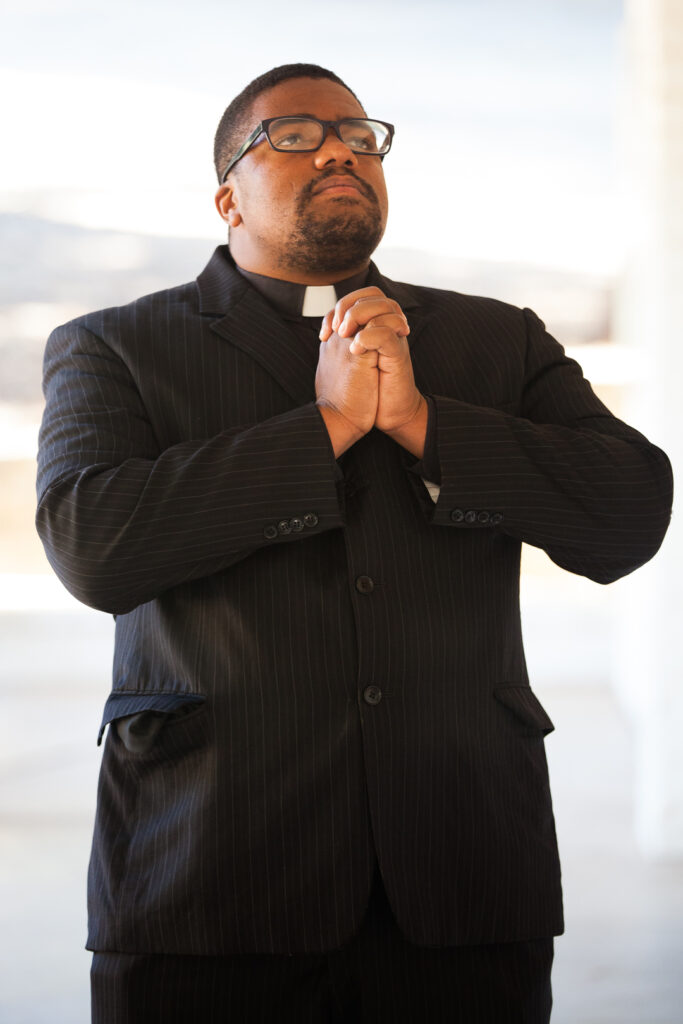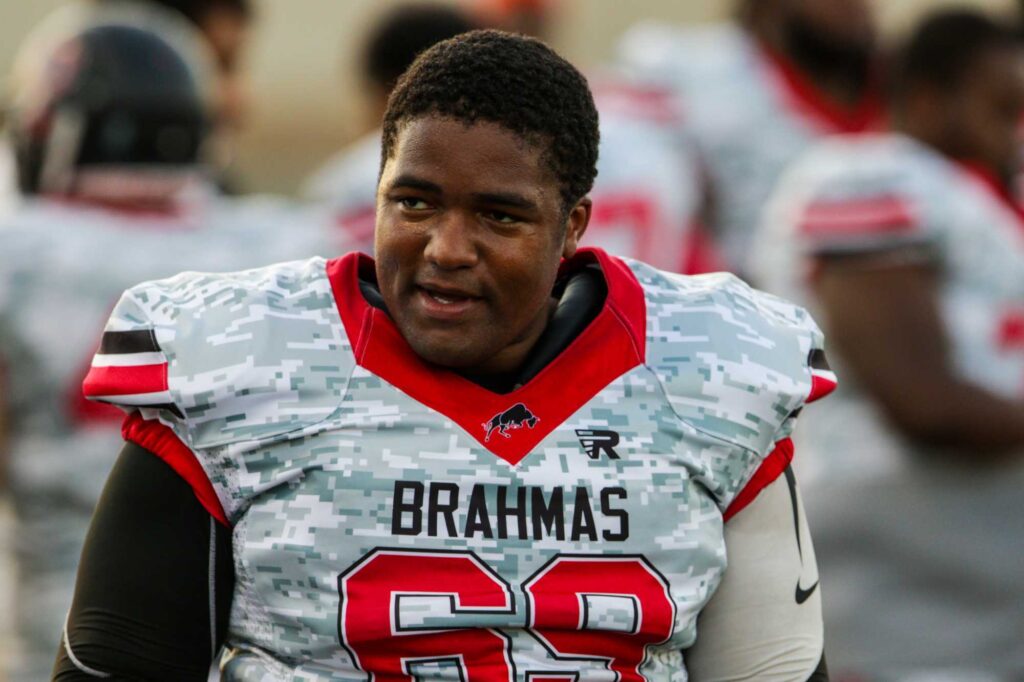
David Tucker performs a jumping side kick at Point Dume Beach in Malibu, Calif., on Nov. 11, 2020. Photo by Benjamin Hanson.

David Tucker plays his bass guitar. Photo by Benjamin Hanson. 
David Tucker holds his hands in prayer at Topanga State Park in Topanga, Calif., on Nov. 11, 2020. Photo by Benjamin Hanson. 
David Tucker at a football game against Pasadena on Oct. 26, 2019. Photo by Benjamin Hanson.
Autism.
Some consider it a lifetime obstacle.
David Tucker, Pierce student and defensive tackle for the football team, defies this stereotype.
While he’s sometimes selective about who he interacts with because of his autism, he has discovered it motivates him to move forward.
“I don’t let being diagnosed with autism spectrum disorder deter me from doing the things that I love to do,” Tucker said.
Tucker said autism doesn’t affect all the things he does. He juggles many disciplines: martial arts, music, ministry and man-to-man defense.
But, other than God, hapkido is his main love and passion. Tucker is a second dan black belt and wants to open his own hapkido studio.
“I want to teach kids with autism and show them what hapkido can do for them like it did for me,” Tucker said.
He said it helps him express his emotions and control his anger.
“I was tired of getting jumped and harassed by these gang members,” Tucker said. “I told my mom, ‘You have three choices: either I join these gangs, you buy me a gun or sign me up for hapkido classes.’”
The 1989 martial art film “Best of the Best,” starring Eric Roberts and Phillip Rhee, sparked Tucker’s interest in all martial art forms.
He said hapkido brings him balance and composure and inspires him to do more for others.
Tucker was diagnosed with autism spectrum disorder at age six. He said he is motivated by his love for God and his ability to be resilient.
His autism diagnosis also doesn’t deter him from exploring his faith. He is a minister at Heavenly Vision Church in Los Angeles and is planning to become a pastor.
“God has always had a calling in my life,” Tucker said, “I’ve had many people speak that over me growing up. A minister on the autism spectrum? You don’t really hear about that often.”
Tucker said preaching his first sermon was a nerve-wracking moment because he stood at the same pulpit that his great-grandfather had for 50 years.
“I was told I had big shoes to fill,” Tucker said. “My great grandfather had his own shoes. I’m still finding my own. It was a humbling experience. You have to go through a lot of studying, prayer research and writing down your own ideas.”
Although he filled his grandfather’s shoes, Tucker grew up not knowing his father.
“It’s always been me, my mom and my three sisters,” Tucker said. “All of us would watch wrestling together and they would root for whoever The Rock was wrestling just to bust my chops.”
Lolita Himes knew something was different about her son when he was a child.
Tucker had a temperament problem and difficulty making eye contact when he would talk to her. It wasn’t until Tucker was in kindergarten that Himes received letters from the school psychologist recommending that he should be tested for autism spectrum disorder.
“When you’re a parent and something is wrong, you feel sad and worried,” Himes said. “I felt a lot of anxiety. A lot of tears were run. That time was difficult because a lot of the doctors weren’t putting him on the right medication.”
As a single mom, Himes looked for male role models for Tucker so he could learn how to be a man and process his emotions.
“God bless the different mentors that David could go and talk to about the things that me as a woman could not,” Himes said. “I’m very grateful for the male mentors that God put in our lives.”
Tucker was inspired to become a musician at 14 when he saw the movie “School of Rock,” starring Jack Black, but his mother didn’t have the money for a guitar until Christmas later that year. Himes thought he wanted an Xbox but was surprised to learn he dreamed of an electric guitar.
Tucker discovered a passion for music and eventually played in a band named Sons of Horus that he co-founded with Logan McGinnis. While he was chasing his dream of becoming a professional musician, he realized that it would take more than talent to make it big in a grimy industry.
He said it takes a few good looks, a whole lot of luck and band members who treat you like you deserve to be treated.
Tucker said he endured mistreatment from McGinnis for years until he left the band in July after McGinnis tried to convince him to steal trash and recyclables out of people’s homes.
He continues to enjoy playing his Fender Telecaster and Precision Bass but does not want to be a serious musician now because his focus has shifted to playing for Pierce’s football team.
Tucker sees the Brahma’s football program as a way to get into Azusa Pacific University, Baylor University or Oklahoma Baptist University to earn a bachelor’s degree, a master’s and eventually a doctorate in theology. He hopes to play more this season after redshirting in the fall of 2019.
Tucker said his hardest challenge is meeting people who don’t understand him or are quick to judge him because he behaves differently than others. He has learned not to care what other people think of him.
“I wish that non-autistic people would understand that autism doesn’t make a person any less than a person without autism,” Tucker said.



